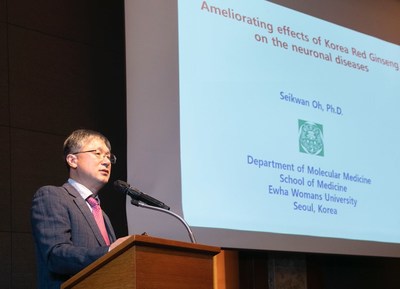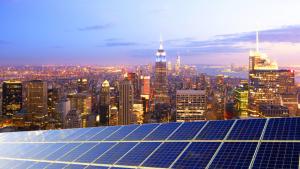
Announcement of the Effect of Ginseng and Red Ginseng for Memory Improvement and Suppression of Bone and Muscle Loss
PR Newswire
SEOUL, South Korea, Oct. 31, 2022
- Effect of improving blood pressure in patients with high blood pressure and diabetes
- Announced at the 13th International Symposium on Ginseng 2022
SEOUL, South Korea, Oct. 31, 2022 /PRNewswire/ -- Experts who have conducted scientific studies on the effect of ginseng gathered in Seoul from all around the world. The Korean Society of Ginseng (chaired by Lee Man-hui) said that the 13th International Symposium on Ginseng took place from the 25th to the 28th at Lotte Hotel Seoul.
Professor Seikwan Oh's team from College of Medicine, Ehwa Women's University verifies that red ginseng improves memory loss and learning ability
According to the findings of a research study in 2022, red ginseng improves the memory loss associated with post-traumatic stress disorder (PTSD)[1]
Post-traumatic stress disorder is stress-induced memory impairment accompanying neuroinflammation. Professor Seikwan Oh's team (joint researcher: Bombi Lee from College of Oriental Medicine, Kyunghee University) conducted a passive avoidance test and Morris water maze test on 48 rats six to eight weeks old (experiment rats), divided in six groups, to verify their learning and spatial cognition abilities after giving a constant one-time stress and injecting red ginseng extract 20, 50, 100mg/kg/1day for 14 days. The results showed the stressed rats lagged when escaping from the maze, whereas the red ginseng-injected group escaped from the maze at a similar speed to the unstressed group. They also checked the figures of various stress-induced inflammatory cytokines. Red ginseng appeared to reduce interleukin-6 (IL-6) and interleukin-8 (IL-8), which are markers of stress-induced inflammation, while increasing interleukin-12 (IL-12), which is the marker of anti-inflammation that suppresses inflammation. In addition, the red ginseng-injected group showed no increase in NF-kB, which increased and caused inflammation in the hippocampus of stressed group, and the generation of mRNA, which is the growth factor of deteriorated cranial nerves, was recovered by 252.51% after injection of red ginseng (p < 0.05).
The team also disclosed the effect of red ginseng on age-related memory impairment (2015). They injected red ginseng extract (approx. 200/kg/1 day) into 32 18-month-old mice divided in four groups for three months after inducing cognitive impairment, and then conducted the Y-maze test to assess the effect on the spatial cognition ability and Morris water maze test to assess the spatial cognition and learning abilities. The result showed red ginseng represses age-related learning and memory failure. The findings verified the anti-dementia effect using the aged experiment animals that had memory failure amid continuous increase in dementia among the aged.
Professor Hyong Young Kwon's team from Soonchunhyang University verifies that ginseng (ginsenoside Rd) suppresses muscle loss
ARIVA.DE Börsen-Geflüster
Published in the Journal of Cachexia, Sarcopenia and Muscle (JCSM)[2] with IF of 12.91(as of 2022)
Professor Hyong Young Kwon's team from Soonchunhyang University said they verified the impact of ginsenoside Rd on muscle cells and effect of strengthening muscles, and identified the action mechanism. The findings were published in the Journal of Cachexia, Sarcopenia and Muscle, 2022, which has an impact factor (IF) of 12.91. The IF is an index figure used to compare and assess the relative importance of journals. Researches published in a journal of IF 10 or higher are regarded highly reliable.
Muscle atrophy is a general degenerative disease which is caused by muscle loss and hypofunction, and can cause various cardiovascular diseases, cancers, blood poisoning, obesity and depression. According to the results of research by professor Hyong Young Kwon's team, the muscle strength of aged mice injected with ginsenoside Rd improved with time to a level similar to that of the general adult mice. Also, their muscle cell C2C12 grew bigger than the control group and the number of nuclei per cell increased from 20% to 37% in over six nuclei.
Such effects appeared the same in muscle atrophy caused by steroid administration as well. The team also identified the mechanism that ginsenoside Rd grows the size of muscle cells by reducing active oxygen within muscle cells increased by TNF-α, the gene that induces inflammation. Ginsenoside Rd grew the size of muscle cells and induced the cell fusion by activating pAKT, which is the pathway essential for protein synthesis of muscle cells and reducing MuRF1 which promotes proteolysis.
In addition, they implied that ginsenoside Rd can be utilized to prevent and treat cancer cachexia-led muscle atrophy by showing that it reduces phosphorylation, atrogin-1 and MuRF-1* that cause inflammation and induce muscle loss activated by TNF-α and interferon-gamma (IFNg), which cause inflammation when cancer cells proliferate or spread. Such effect of ginsenoside Rd in suppressing muscle loss also appeared in a cell test using human skeletal muscle cells (HSkM), the same as in the animal cells.
Professor Narayanan's team from University of Michigan verifies that red ginseng prevents bone loss by keeping balance in intestinal microorganisms[3]
The intestinal microbiota is an important controller for bone health. Intestinal microorganisms unbalanced or reduced in variety and number by extensive antibiotic treatment can bring bone loss, and it is known that bones are healthy when the intestinal microorganisms vary in types.
The professor's team injected a broad-spectrum antibiotic into 21 adult male mice divided into four groups for two weeks, and then for four weeks injected water into one group and red ginseng extract 500mg/kg/1day into another group. As a result, the variety of intestinal microorganisms of mice decreased significantly after the injection of antibiotic, but it was significantly suppressed in the red ginseng-injected group, along with suppression of barrier damage. In addition, bone loss occurred considerably in femur and spine of mice, but this was prevented in the red ginseng-injected group.
Professor Vuksan's team from Canada verifies that ginseng improves blood pressure of patients with high blood pressure and diabetes, and is safe for consumption by the patients[4]
Professor Vuksan's team from Canada conducted a clinical test on 80 patients with Type 2 diabetes and high blood pressure for 12 weeks, and found the center systolic blood pressure significantly reduced in the group administered with Korean red ginseng and American ginseng in parallel after 12 weeks (reduction by 3.98±2 mmHg, p=0.04). Above this, there was no significant change in the pulse wave velocity and reactive hyperemia index which are used to assess the function of blood vessels. Accordingly, it confirmed that ginseng can improve the center systolic blood pressure of diabetic patients when administered auxiliary, apart from medication, without directly affecting the function of blood vessels.
Moreover, professor Seo Sang-hee's team from Chungnam University presented that ginseng improves immunity against the infection of COVID 19 and enhances immunity with time. Researchers from other countries also revealed their research findings on various effects of ginseng and red ginseng. Such as Professor Tianshi Wang's team from Shanghai Jiao Tong University, China. They unveiled the effect of ginsenoside Rh1, one of the active ingredients of red ginseng, in suppressing the risk of metastasis of breast cancer.
[Reference] * STAT3 phosphorylation, atrogin-1, MuRF-1
STAT3 (signal transducer and activator of transcription-3), atrogin-1 and MuRF-1(muscle ring finger=1) are proteins that promote the generation of various genes within cells, and atrogin-1 and MuRF-1 are especially involved in muscle cell fusion and differentiation.
| [1] Seikwan Oh, Bombi Lee, Bongjun Sur, Neuroprotective effect of Korean Red Ginseng against single prolonged stress-induced memory impairments and inflammation in the rat brain associated with BDNF expression, Journal of Ginseng Research 46 (2022) 435-443 |
| [2] Hyog Young Kwon, Yoseph Toni Wijaya et al., Ginsenoside Rd ameliorates muscle wasting by suppressing the signal transducer and activator of transcription 3 pathway, Journal of Cachexia, Sarcopenia and Muscle 2022 DOI: 10.1002/jcsm.13084 |
| [3] Narayanan Parameswaran, H.J. Kang, N. Chargo, S. Chennupati et al., Korean red ginseng extract treatment prevents post-antibiotic dysbiosisinduced bone loss in mice, Journal of Ginseng Research, https://doi.org/10.1016/j.jgr.2022.08.006 |
| [4] Vladimir Vuksan, Elena Jovanovski, et al., Vascular effects of combined enriched Korean Red ginseng (Panax Ginseng) and American ginseng (Panax Quinquefolius) administration in individuals with hypertension and type 2 diabetes: A randomized controlled trial, Complementary Therapies in Medicine 49 (2020) 102338 |
![]() View original content to download multimedia:https://www.prnewswire.com/news-releases/announcement-of-the-effect-of-ginseng-and-red-ginseng-for-memory-improvement-and-suppression-of-bone-and-muscle-loss-301663364.html
View original content to download multimedia:https://www.prnewswire.com/news-releases/announcement-of-the-effect-of-ginseng-and-red-ginseng-for-memory-improvement-and-suppression-of-bone-and-muscle-loss-301663364.html
SOURCE The Korean Society of Ginseng

Mehr Nachrichten kostenlos abonnieren
(Mit der Bestellung akzeptierst du die Datenschutzhinweise)

Hinweis: ARIVA.DE veröffentlicht in dieser Rubrik Analysen, Kolumnen und Nachrichten aus verschiedenen Quellen. Die ARIVA.DE AG ist nicht verantwortlich für Inhalte, die erkennbar von Dritten in den „News“-Bereich dieser Webseite eingestellt worden sind, und macht sich diese nicht zu Eigen. Diese Inhalte sind insbesondere durch eine entsprechende „von“-Kennzeichnung unterhalb der Artikelüberschrift und/oder durch den Link „Um den vollständigen Artikel zu lesen, klicken Sie bitte hier.“ erkennbar; verantwortlich für diese Inhalte ist allein der genannte Dritte.




